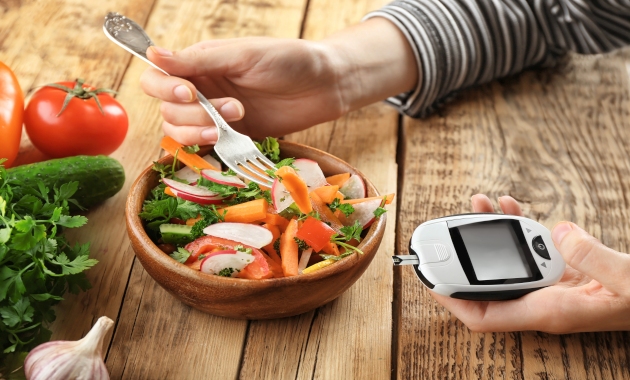
Whether you have diabetes or are at risk of diabetes because of family history, switching to a healthy eating plan is the first piece of advice that comes from your doctor or loved ones. And so the journey to eliminate foods rich in carbohydrates & glucose from our diet commences. But what most people are unaware of is that by doing so, you tend to cut down on your nutrient intake, which in turn can affect your overall health.
As many diabetics may miss out on a lot of nutrients due to food restrictions, we are sharing a few simple tips to get the most of the nutrients through the food you eat. Here’s to getting started!
1. Switch to healthy snacks
It goes without saying that processed foods are a strict no-no for diabetics but choosing the foods that can help you satiate your hunger, not add up your caloric intake & make you feel full for a longer time is a huge task. This is where healthy snacking comes into the picture.
You can opt for a bowl of sprouts sprinkled with flaxseeds or go for a bowl of low-GI foods like makhana which are loaded with fiber. These snacks can not only prevent frequent cravings as they can keep you feeling full but are healthy as well.
If you fail to get your daily dose of nutrients through diet, try Nestle RESOURCE Diabetic powder which provides all the essential nutrients and has a low GI index.
2. Opt for healthy nuts
Most often than not, we are told to stay away from nuts as they are considered to have high-fat content. Excessive fats can not only increase our calorie intake but also put us at risk of high cholesterol levels. However, dietary fats can be of two types – good fats and bad fats. Some nuts are rich in good fats such as monounsaturated fats and polyunsaturated fats which are needed by the body as they not only provide energy but also play a vital role in vitamin absorption.
To curb your evening cravings, you can eat nuts like walnuts and almonds. Opt for non-salted ones as these not only fill you up but also keep your blood sugar under control as they are not rich in glucose.
3. Choose low-glycemic index (GI) fruits
What’s best to keep your hunger and cravings at bay than having some fruits. But diabetics need to be extra careful when it comes to picking the fruits as most of them are loaded with glucose which can cause a sudden surge in glucose level. So pick low-GI fruits such as apples, guava, pear & oranges for your evening snack time.
Make sure to not eat more than a medium-sized apple or a small-sized pear as portion control is the key. Also, prefer whole fruits over fruit juices as the former is high in fibre.
4. Vote for healthy fluids instead of sugary drinks
A cup of tea/coffee is the best bet to start your day on a high energy level or get your creative juices to flow. But tea and coffee are not only loaded with caffeine but also contain added sugar. If sugarless drinks are not an option for you, then try alternatives like infused water, warm soups, coconut water, or smoothies which can keep you hydrated and also restrict your sugar intake to a minimum.
5. Try supplements to keep up with nutrients
If your diet fails to meet your nutritional needs, which is mostly a concern for people with diabetes, due to various food restrictions, then you can try nutritional supplements. These supplements not only help you to fulfill your body’s nutrient requirements which are quite challenging to maintain with a good diet plan but also help you to maintain your daily intake of vitamins, minerals, and fiber.
There is no doubt that people with diabetes need to be extra vigilant about what they eat and how they eat. But making simple tweaks to your daily diet plan can do wonders in helping you manage diabetes and get the most of the nutrients from your diet. So eat healthy to stay healthy!
Disclaimer: This is a sponsored article powered by Nestle Health Science. The information provided in this article is in the form of text, tips, suggestions, and products, which comprises general advice for consumers. Tata 1mg does not endorse any brands and is not responsible for their efficacy.
References:
1. Gray A, Threlkeld RJ. Nutritional Recommendations for Individuals with Diabetes. [Updated 2019 Oct 13]. https://www.ncbi.nlm.nih.gov/books/NBK279012/
2. Nutrition Principles and Recommendations in Diabetes. Diabetes Care Jan 2004, 27 (suppl 1) s36. https://care.diabetesjournals.org/content/27/suppl_1/s36
3. Ley SH, Hamdy O, Mohan V, Hu FB. Prevention and management of type 2 diabetes: dietary components and nutritional strategies. Lancet. 2014 Jun 7;383(9933):1999-2007. https://www.ncbi.nlm.nih.gov/pmc/articles/PMC4751088/